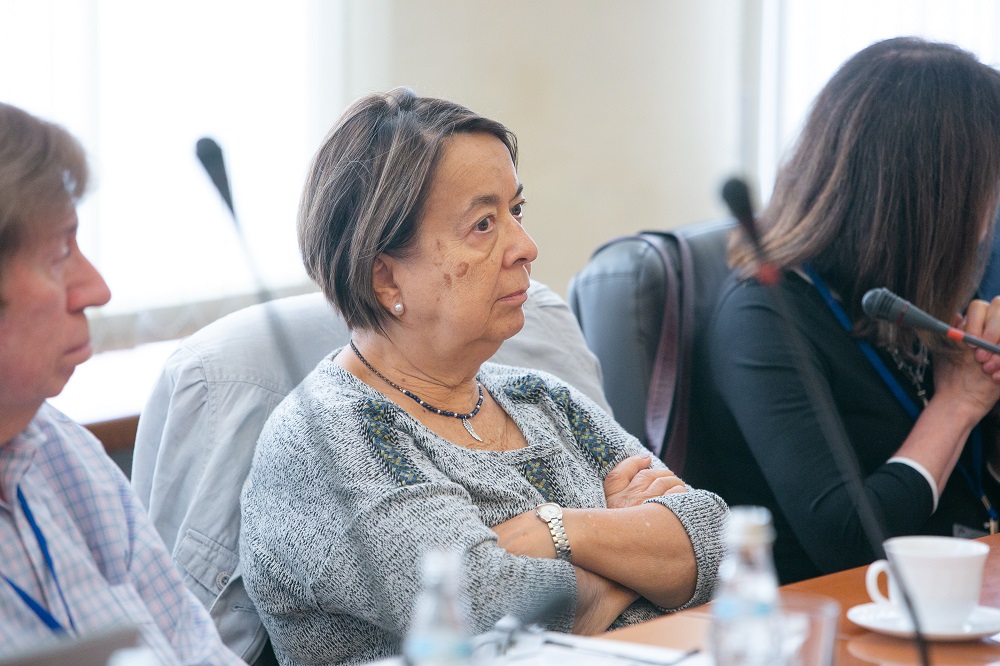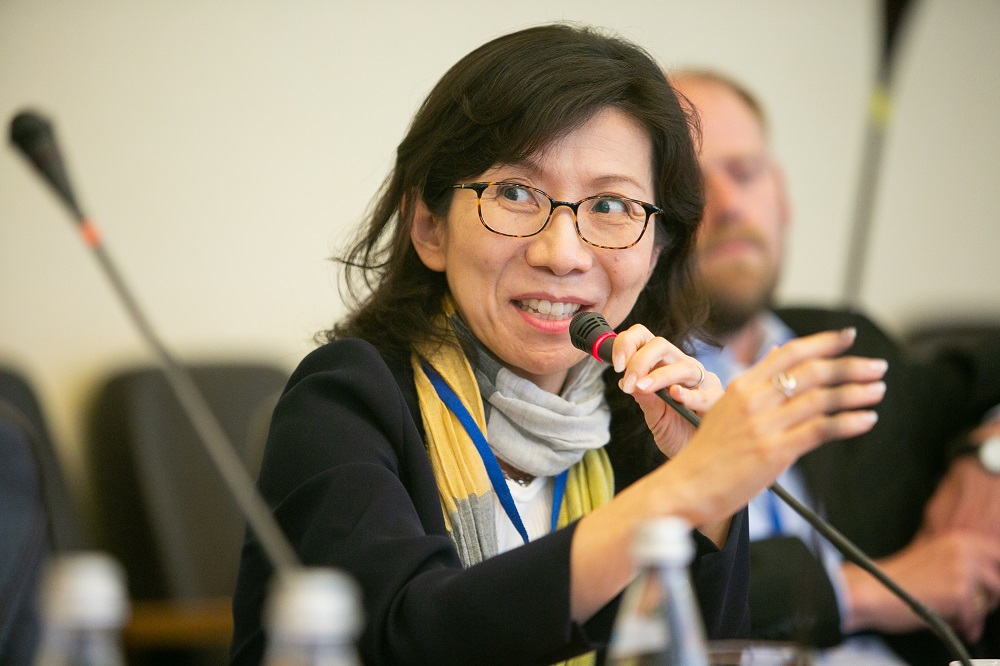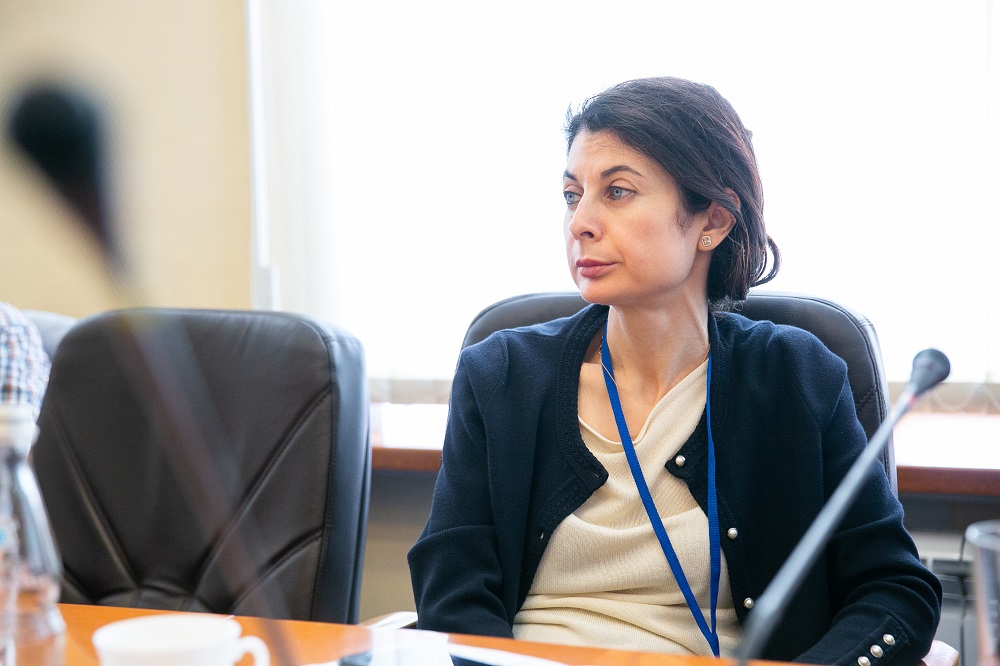General Assembly of International Academy of Education Meets at HSE Moscow
On May 23-24, following the Days of the International Academy of Education held earlier this week, the General Assembly of the International Academy of Education took place at HSE University Moscow. The assembly brings together education researchers and experts from all over the world, and this is the first time that the biannual meeting was held in Russia. Over the course of two days, members discussed joint projects and publications and met newly inducted members who had the opportunity to introduce themselves and present their research. Members also took part in small group discussions on a variety of topics, including digital literacy and math education.
HSE News Service spoke with several Academy members about the main challenges education faces today and how these challenges can be addressed.
© HSE
J. Douglas Willms, President of the International Academy of Education, Canada Research Chair in Literacy and Human Development, President and CEO, The Learning Bar
I always situate reading—getting children to read by age 8 or 9—as the fundamental challenge of every country. In some countries, like Russia, Canada, and the US, usually we have about 30% of children who do not learn to read well by 8 or 9. They are vulnerable for the rest of their lives: they struggle in school, and they have much more difficulty finding employment when they finish school, in addition to having all sorts of problems. I want to be able to look at what happens not just from birth but even from conception all the way through to when they start school (that’s another important transition), and then again when they get to 8 or 9 and say ‘how many children in your country are able to read well at that age?’ because society is facing more and more demands on reading skills—even with the advent of technology and so on, they still need to be able to read well.
So, when you look at some of the countries—low income countries like in Africa, for example—the level of children reaching an intermediate benchmark is only about 10%. Then it becomes a problem for successive generations because then the teachers don’t have the skills. It becomes inter-generational.
Trying to always improve reading skills is very fundamental
There is no definitive solution yet. We’ve been working hard at developing a programme to improve children’s decoding skills (being able to start with the symbols of a word and sound it out) from the time they start school until they are 8 or 9. Russia’s reading skills are improving more and more—it’s one of the only countries that has been improving every year. That’s good news for Russia.
 © HSE/ Mikhail Dmitriev
© HSE/ Mikhail Dmitriev
Maria de Ibarrola, Professor and researcher at the Department of Educational Research, Center for Research and Advanced Studies, Mexico
To me, the most important challenge education is facing now is the need to make schooling less rigid and hierarchical.
In many countries there are no other educational opportunities outside schools - there is no place for music, arts, or sports
That’s especially true for countries like Mexico where the school budget is very limited so there is hardly enough money for academic subjects themselves, much less for widening the educational experience.
What’s also important is that the idea that the future of education is the knowledge society is not really applicable everywhere. There are alternatives. The kind of knowledge society that is being endorsed by the US or the European countries does not necessarily work for everybody. Children should still be taught basic skills – they need to learn reading, writing, mathematics and languages, but they also need relevant knowledge in history, geography, civics, and philosophy. Most importantly, it all has to be relevant to the context of their community. Some countries have a large proportion of people in higher education, some do not. Regional differences are very important, as well as regional differences within the countries. Young people need to have a wide range of educational opportunities.
© HSE
Lorin W. Anderson, Distinguished Professor Emeritus of University of South Carolina, USA, Co-founder of the Center of Excellence to Prepare Teachers of Children of Poverty
The biggest challenge education faces throughout the world is the increased diversity of the student population
For generations we only educated the upper level of our societies. Then the laws came in that mandate education for all, but people do not know how to deal with education for all. It is a very good motto, a statement of ideal, but the process is not necessarily something people are very clear about.
There is an opinion that in order to be educated there has to be a set number of standards and criteria. Others would say that in a situation of diversity, fixed standards do not work. People who come in with a little bit of an advantage from their home or community are more likely to achieve those standards more rapidly. So, it’s necessary to treat diversity with diversity. To give an example, the worst thing to be in the US is to be a very strong student in a school where most of the students are poor, because the curriculum tends to get focused on the middle. This restricts the learning potential of these students.
There are attempts to deal with education in terms of developing students over time. This requires assessments that focus on accomplishment, development, and achievement, which we don’t have at the moment. The only thing that we have is a test, which does not allow us to see a child’s progress over time. I am a big proponent of ‘portfolio assessment’, but in this case the teachers become disadvantaged, because if the portfolio does not show any progress, that reflects poorly on the quality of teaching.
Essentially, every decision made in education disadvantages one group of people and advantages another group of people. The most important thing is to find the right balance.
© HSE
Andreas Demetriou, Professor Emeritus, University of Nicosia, Cyprus
The challenges education is facing have definitely changed. A big change is the vast expansion of university education—at least in the West. About 2/3 of secondary school graduates go onto university. In Cyprus, for example, 73% of secondary school graduates get a university degree. This has implications for the quality of education in the universities because the student body is not the same as it used to be. Many of the students may not be ready to perform in various scientific fields at a satisfactory level. The university system is not prepared to deal with their learning demands.
Another challenge relates to the fact that at all levels of education we have to deal with learning difficulties that result from changing family structures. For example, there are countries in Europe where more than half of children are from families where one of the parents is not their biological parent. This causes serious problems for many children in terms of their socialization and it has implications for their learning process.
Another problem is being able to diagnose early on the children in need of support and to develop the necessary services in education, psychology, social work and so on to address school problems such as bullying.
I think the most successful country in dealing with these problems at all levels is probably Finland. The Finnish system in its current form was designed 25-30 years ago and the changes were implemented at several stages. Most importantly, they have changed teacher education. Finnish teachers are probably the best educated teachers in the world. They have also changed the organization of the classroom so that they can easily identify and solve problems.
You can look at best practices and see how you can adapt them to your country
We have to be aware that education in every country is part of its history, culture, and political life, and it’s it not easy to transfer one system to another.
 © HSE/ Mikhail Dmitriev
© HSE/ Mikhail Dmitriev
Yuko Tarumi, Musashi University, Japan
I would say the biggest challenge in education is the way in which societal inequality is reflected in education. Japan, for example, had a very egalitarian education system for a long time. Education was seen as a meritocratic tool – even if you were not from a wealthy family, if you got a good education, you had good career prospects, but today that is changing.
Since there is more inequality within society as a whole, education now is being used to strengthen this inequality
Wealthy parents get their children admitted into better schools at an earlier stage to make sure that their children receive good education, go to a good university and then get a good job.
Generally, education in Asia is quite selective – students take qualifying exams at each stage of their education. The fact that we have these testing systems makes people believe that it is a meritocratic system – a child gets into a good school because he/she scored highly. But in actuality, in the case of Japan, parents invest heavily in their children’s test performance. Our school resources in Japan are quite equal across the board, unlike in America, for instance, so public schools do not vary in quality so much. What makes a difference is how much parents add to that – and this difference manifests itself in test scores. These scores are therefore more a reflection of whether the child came from a privileged environment, and less on merit.
Recently, Japan has been trying to move away from test assessment for university admissions and to take a little bit of the American approach by looking at the kinds of activities students do, recommendation letters, projects, and so on. But this component is still not very significant. Then again, if we start measuring volunteer experiences, for example, it may only add to the inequality because certain parents know how to prepare for that.
 © HSE/ Mikhail Dmitriev
© HSE/ Mikhail Dmitriev
Olga Zlatkin-Troitschanskaia, Full Professor, Chair of Business and Economics Education, JGU Mainz
The biggest challenge today is probably dealing with the effects of internationalization, globalization and digitalization. On the one hand, these are wonderful developments with huge potential, particularly for education. But at the same time, they present big challenges, because student bodies are changing immensely. More and more often, we have students coming to various levels of educational institutions with very different skillsets and knowledge levels. And for us that means that we need to think about how we can develop more individualized approaches as well as how we can invest more in objective assessment.
Digitalization presents a particularly big challenge. We are all well aware that when students are sitting in class, they are also online. On the one hand, this presents huge potential, and we should change the classroom setting to meet this potential. But on the other hand, initial empirical studies have shown many negative effects.
For example, learning with one source of information—whether it be a book or lecture recordings—has been shown to be much more effective than using a large number of different information sources. One of the hypotheses for this is that using too many sources causes information overload.
Kids from kindergarten up need to be taught how to use the internet to retrieve information as well as how to critically evaluation this information. Right now, we’re not doing this
There are various hypotheses about the negative effects of the internet on learning: there is the so-called ‘multiple attention’ theory about how students cannot focus; there is the Stavanger hypothesis about how screens change the way we read. Colleagues engaged with cognitive psychology, cognitive science and neural science say that digital technology changes the way we process information. This changes the way we learn. But learning systems today have not really changed. They are very traditional—both in schools and universities. And we need to start changing this.
See also:
'You Find Yourself Thinking about Your Research 24/7'
Daria Gracheva, expert at the Institute of Education, turned to science in pursuit of methods to discern between a poorly constructed test and a well-designed one. In this interview with the HSE Young Scientists project, she discusses the '4K test,' which is intended to measure critical thinking and communication skills, shares insights on the model named after Georg Rasch, and explains how setting up an aquarium for a crab can help assess soft skills.
HSE University-St Petersburg Represents Russia at International Conference in Australia
The delegation of HSE University-St Petersburg participated in the largest educational forum-exhibition of the Asia-Pacific Association for International Education 'APAIE 2024'. The 20th anniversary conference was held in the Australian city of Perth.
Inverse Relationship Found between Propensity to Innovate and Academic Success
Mariia Evdokimova and Anastasia Stepanova, employees of HSE University’s Faculty of Economic Sciences, studied the connection between students’ personal characteristics and their desire to create something new. The researchers have found that students’ propensity to innovate lowers their GPA. The results of the work were published in the preprint ‘Students’ Propensity to Innovate: Correlates, Determinants, and Impact on GPA.’
Social Connections Help Women Achieve Academic Success
Social integration has different effects on the academic achievement of women and men. Researchers from HSE University’s Institute of Education studied the connections between academic performance and social integration among 4,500 young Russians. It turned out that this connection is much stronger than it might seem at first glance, and that it is more important for women. The results of the work were published in the Journal of Social and Personal Relationships.
A University's Special Status Is Correlated with a Substantial Increase in Salaries for Graduates
A university education is a highly sought-after commodity in Russia, yet the quality of universities and their programmes varies significantly. This gives rise to risks of inequality, both in the realm of education and in the labour market, and subsequently impacts the returns on higher education, which are manifested in the salaries earned by graduates. According to a study by Ilya Prakhov, Assistant Professor of the HSE Faculty of Economic Sciences, graduates from Russia’s top-tier universities enjoy a distinct advantage. The paper has been published in the International Journal of Educational Development.
HSE University and Moscow Planetarium Sign Cooperation Agreement
The parties will work to popularise science and conduct educational and research activities, including in the fields of astronomy, cosmonautics, and Earth science. The agreement also covers the implementation of joint practical programmes and internships for students.
HSE University and Agency for Strategic Initiatives Sign Cooperation Agreement
HSE University and the Agency for Strategic Initiatives (ASI) have agreed to cooperate in the development of new technologies, the digital transformation of the economy, and the social development of the country. The agreement was signed by HSE University Rector Nikita Anisimov and ASI Director General Svetlana Chupsheva at the St Petersburg International Economic Forum.
Basic, General, and Home-based: Why Families Choose to Homeschool and What Challenges They Face in Doing So
There are many reasons why families choose to homeschool their children, from wishing to personalise their education to protecting them from bullying to strengthening the family bond. Those who decide to switch to homeschooling can face quite a few challenges, both logistical and psychological, including criticism from family members. IQ.HSE presents a few facts on homeschooling in Russia based on a paper by researchers of the HSE Institute of Education.
Card Index: Uberisation of Education
Education is in the process of being partly reformatted into an on-demand service, with digital platforms quickly and efficiently matching teachers to students. This can make education more personalised and accessible and open up new professional development and money-making opportunities for teachers. But is an Uber-like model really good for education? The following discussion of uberisation in education is based on a paper by philosopher Timur Khusyainov, Deputy Dean of the Faculty of Humanities at the HSE Campus in Nizhny Novgorod.
HSE University and Sberbank Sign Cooperation Agreement
HSE University and Sberbank have entered into a cooperation agreement. The document was signed by Herman Gref, CEO and Chairman of the Executive Board of Sberbank, and HSE University Rector Nikita Anisimov. The agreement is aimed at the implementation of shared educational, research, career-guidance, awareness-raising, and informational projects.


